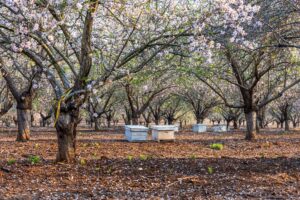
Six years ago the National Honey Board, Almond Board of California, Project Apis m., and CollaborateUp united to illuminate the symbiotic relationship between honey bees and the agricultural industry in the inspiring documentary “The Job Swap Experiment.” In honor of the millions of honey bees pollinating almonds in the kickoff to the pollination season, it feels like a great time to revisit this project and what it represents.
About the Film:
This 25-minute film puts almond growers and beekeepers in each other’s shoes, offering a firsthand look at what each industry does to protect bees. It features growers, beekeepers, crop advisors, and hive management advisors, who use their expertise in insects to provide insight into pollinators and all that they do for our food. You can view the film below:
The Importance of Honey Bee Pollination:
Without honey bees, around 90 crops that grow in the U.S. wouldn't exist, including almonds. The U.S. almond crop is a prime example of how bees impact our varied food supply. The major California-grown crop needs cross-pollination from bees to grow, and the bees also benefit from the nutritious almond pollen.
"Honey bee health is a matter that is close to our hearts," said Bob Curtis, Director of Agricultural Affairs, Almond Board of California. "Because of their essential role in pollination, the California Almond community has funded over 100 research projects supporting honey bees, more than any other crop group, and adopted practices to protect bees in the orchard and beyond."
It's a mutually beneficial relationship and just one instance of honey bees' vital role in our food supply. Other examples of majorly-consumed foods that rely on pollinators include coffee, apples, peaches, blueberries, melons, avocados, and carrots, among many others.
"The global agriculture industry depends on healthy honey bees and other pollinators. Without pollinators, more than $15 billion in U.S. agriculture and the future of our food supply would be at risk," said Margaret Lombard, Chief Executive Officer, National Honey Board. "We at the National Honey Board are grateful for the work the almond industry does to protect bees and we feel a strong responsibility to educate key players in the agriculture industry and consumers on the problems at hand. We're glad to have partnered with CollaborateUp, Project Apis m. and the Almond Board to bring this important story to life."
"Most people do not realize what it takes to pollinate our food crops. Almond trees alone rent two-thirds of the nation's bees for pollination. After almonds, these working bees move to apples, berries and seed crops," said Danielle Downey, Executive Director, Project Apis m. "Our health depends on healthy honey bees, and there is no back up plan if they fail. This film transports you to the largest pollination event in the world and shows how we can all work together to ensure its success."
"During filming, our job-swappers learned firsthand the vital importance of planting nutritious forage that bees can feed on while they're working in and around production agriculture," said Richard Crespin, Chief Executive Officer, CollaborateUp. "We'd like to see more growers plant these crops, and we as consumers can help them by supporting programs like Project Apis m.'s Seeds for Bees, which helps subsidize planting forage cover crops. We hope that more people will watch the film and donate to important programs to help maintain a healthy population of bees."
Spring is right around the corner and is the perfect reminder of the importance of pollinators, including honey bees, and the impact they have on our food supply. Anyone can help secure the future of our food by supporting pollinators. Planting pollinator-friendly flowers, eliminating weeds by hand instead of with pesticides and donating to pollinator-focused organizations are all worthwhile ways to help. Find more information on ways to help the bees here.